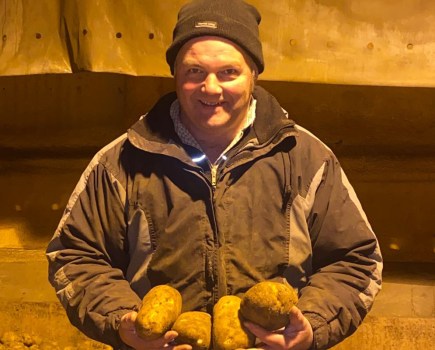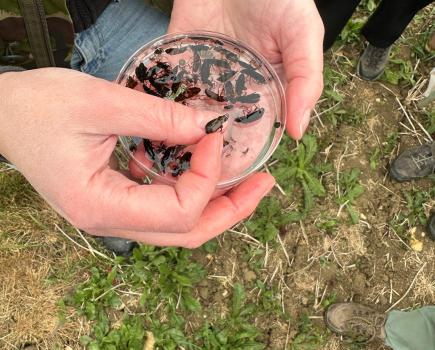 In my thoughtful hours during the solitary confinement of the combine cab, I sometimes compose little lists in my head such as the most tedious jobs on the farm that I’d rather be without.
In my thoughtful hours during the solitary confinement of the combine cab, I sometimes compose little lists in my head such as the most tedious jobs on the farm that I’d rather be without.
Spraying in fields full of pylons and posts has got to be on the list. The constant folding and unfolding of the booms every few minutes gets firmly on the wick. The temptation is to just ignore the trams and give the poles a wide circular berth. But such shoddy practice knocks down corn and leads to poor applications with the inner curve of the boom putting on multiple amounts of the rate compared with the outer to the point that, in theory, you’re probably ignoring the label and breaching the law.
There’s also the considerable danger of working around electricity. A harvest doesn’t seem to go by where someone somewhere doesn’t touch a high-voltage power cable with the unloading spout on the combine. The advice in such situations is to sit tight in the cab and not to get out for fear of earthing several thousand volts through one’s corpse.
Mercifully I’ve never been in this predicament but I imagine it must take quite a bit of nerve to repress the flight instinct when faced with danger and rather to phone for help to get the power turned off. Having said all that, it’s not sensible to blame the pylon for the danger here – we need to remember which object is stationary and which object is being manoeuvred. I understand that every year there are several hundred incidents involving agricultural machinery and electric wires and we all need to be more careful, especially when working late at night in the combine as we battle the elements to bring the harvest home.
It’s good to see the NFU and the ENA (Energy Networks Association) are reviewing the amount farmers get paid for hosting these impediments to in-field work. The current rates for pylons and poles simply doesn’t reflect modern machinery and the amount of time and crop loss they incur. One would like to think payments would include compensation for the stress I’m caused with the constant unfolding and folding but maybe that’s a little greedy.
I often think the low payments we get for these pylons and posts is a reflection of a time when our fathers and grandfathers were desperate to have electricity on their farms so didn’t protest very much about the necessary infrastructure marching over their fields that got the power to the yard. I suppose I ought to remember when swearing about the inconvenience of spraying the fields next to the farm that life without electricity would be a good deal worse.
This issue of compensation for masts and poles is also addressed in the new Electronic Communications Bill going through parliament now. The bill undoubtedly erodes the rights of landowners when it comes to the task of rolling out higher speed broadband and improved mobile phone signal. As someone who hosts a mast I know they can be nice little earners but I’m also aware that in low usage rural areas this can add to the cost of providing better mobile signal.
If this new Bill leads to lower compensation for landowners but better signal and broadband then I think I need to put my own selfish interest behind the greater good. And if it gets me better mobile signal that’s yet another area of stress in my life made more bearable. There’s also the thought that one day I might be the poor sod whose unloading arm on the combine is touching a high voltage cable. It’s times like that you really appreciate good mobile signal over the chance of a few more quid for hosting a mast.
Another candidate for most tedious task is filling in endless yellow forms to give to the lorry driver every time a load leaves the farm. To be clear, I’m not knocking assurance schemes because these schemes don’t really hinder my professional life but the repetitive task of poring over those yellow forms with the biro when you get off the loader does get a trifle tedious.
It’s an interesting thought to do the maths on the number of passports farmers fill in during an average year. It must be the best part of a million. That’s a lot of A4 sheets and a lot of farmer time. So it’s interesting to note that e-passports might soon be available to add a bit of digital convenience to my farming life.
Working through a touch screen with drop-down option menus makes sense to me. But, as ever, there are pitfalls to doing things digitally – namely finding yourself without signal. It’s essential that if e-passports are rolled out they must be backed up by the old paper option. But if e-passports allows the grain chain to work more cohesively and more transparently then I’m all for it. And of course, if information about what leaves the farm is going on-line then logically so should information about what arrives at the intake. What’s sauce for the farmer goose is also sauce for purchasing gander.
Rapeseed woes
My oilseed rape harvest was not a vintage one. The most likely culprits to explain the poor yield are lack of sunshine, verticillium wilt and cabbage stem flea beetle. Nationally we really need some comprehensive work done on what has caused this year’s poor OSR harvest. If it is flea beetle, either at establishment or in the stem, then it strengthens the case for a neonictonoid emergency use application next year.




